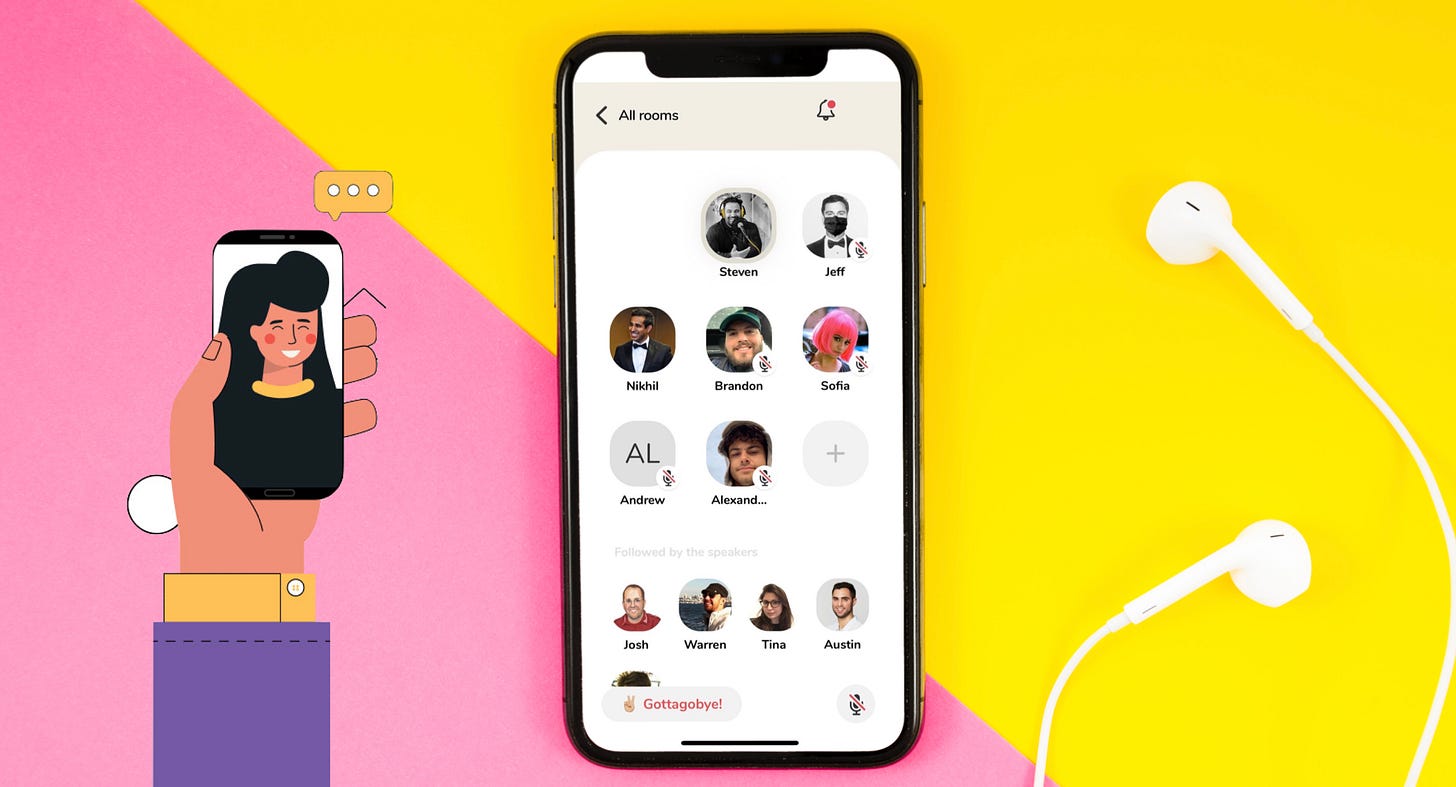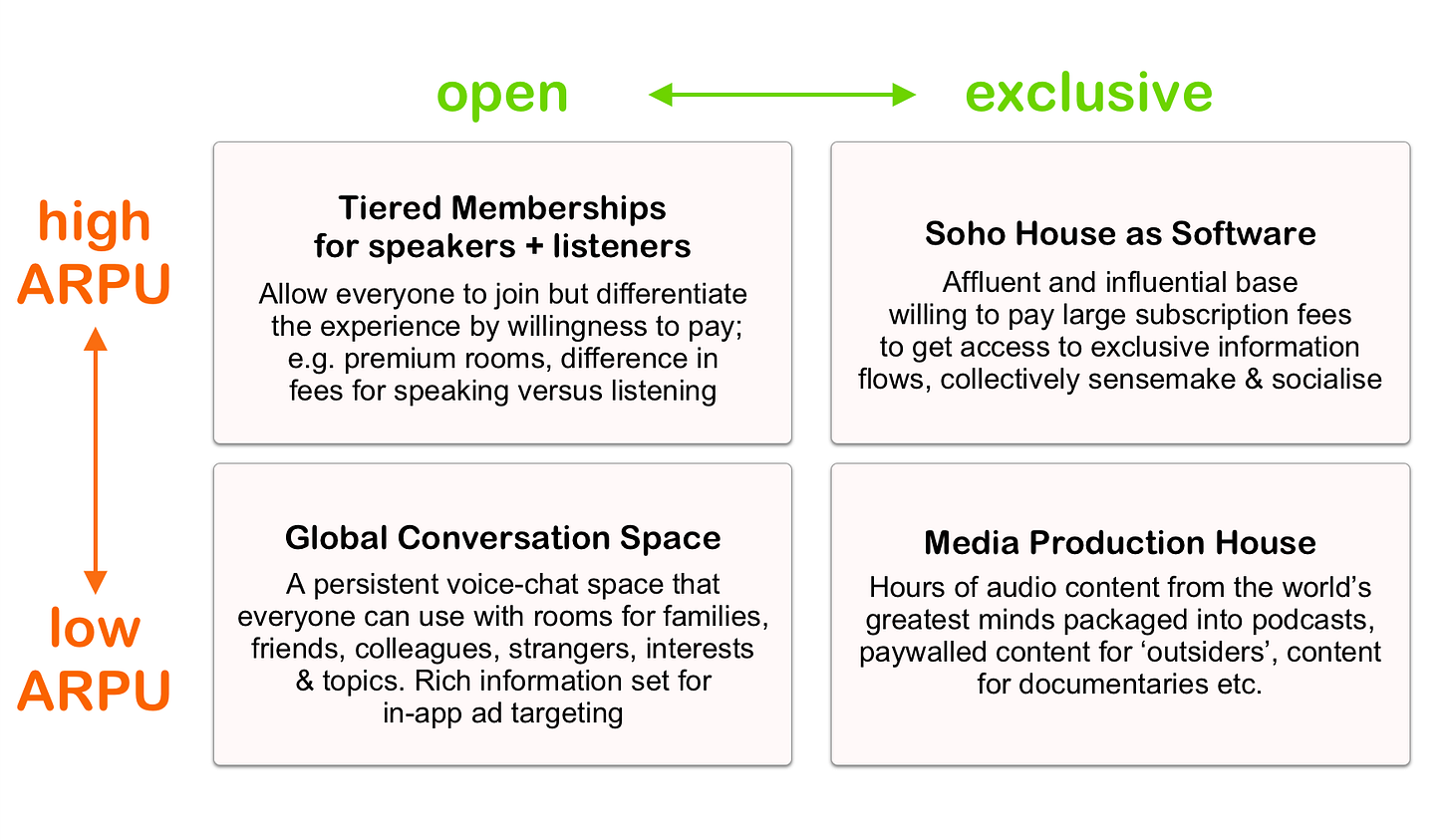#5 - Clubhouse
$100m and beyond?
Long time, no speak - let’s get straight into it!
If you’re on Tech Twitter, today we saw a new rupture in the ongoing culture war: Clubhouse raised $10m at a $100m valuation from A16z, despite it only having 2000 users.
If you haven’t heard of Clubhouse, think of an audio-only HouseParty that is currently only available to a select group of people: VCs and Silicon Valley darlings.
Going one level deeper , it’s a social network for spontaneous voice-chats in groups. People can jump into rooms to listen in and contribute to mega-exclusive conversations. Clubhouse is kinda like the Davos Summit for the Tech elite, made into an app.

The response to the fundraising news has been divisive:

For the people that aren’t waving their hats in support, their criticism of Clubhouse’s fundraising can be generally categorised along one of these themes:
No Business Model: no revenue and no public plans for monetisation
Low Traction: "it only has 2000 sign-ups!”
VC Bias: VC’s love using the product and they’re massively over-biasing on how others will use it
Opportunity Cost: the world needs money flowing to solutions that will save the world, not a toy for VCs
Founders Selling Shares Already?: with each co-founder taking home $1m each, something stinks
On the other hand, the response from people congratulating the company tends to follow one of these themes:
Social Is Back Baby: with the world looking to connect in new ways, we’re seeing more fun solutions being developed to help people connect. This fundraising is money flowing into that space, which will help encourage more products in this space
I Love This Product: if you couldn’t already tell from the screenshots that users have been sharing of the celebs in their room, some people just want to remind you of how fun and valuable the product is in their lives
Forget The Valuation: $100m valuation is inconsequential. Ultimately, this is a small bet from A16z which could have an outsized return, and for the founders, they get enough runway to run through the idea-maze for building spontaneous-social products (either as Clubhouse today or as new product iterations).
Founders Are Nice: okay, cool.
All of the points are interesting in their own right, but I think there’s one big thing missing from the responses.
Clubhouse Possibility Space
Instead of asking the question of whether Clubhouse is worth $100m or not today, a more interesting question is this: How could Clubhouse be worth a lot of money in the future?
The un-nuanced take usually assumes that in order for Clubhouse to realise its potential, it needs to reach Facebook / Instagram level of scale and then figure out monetisation - probably through ads.
I want to dive into the possibilities a little more.
Let’s consider the Clubhouse possibility space along two axes:
Exclusivity: does Clubhouse keep the app an exclusive experience or does it open it up to everyone in the world?
ARPU (Average Revenue Per User): does Clubhouse try to generate a lot of revenue per user ($100+ per month) or a small amount of revenue per user (e.g. Facebook’s ARPU per month is c.$2 globally)

Soho House as Software
Clubhouse’s beta network comprises of high net-worth, well-connected, leaders of industry: startup CEOs, VC partners, exited entrepreneurs, etc.
Most people talk about this with the intention of criticising the company and the size of the opportunity.
But what about if Clubhouse’s exclusivity persists over time?
I’d be curious to see what Clubhouse’s retention and engagement figures are with this cohort of tech influencers. If usage is persistent over time, maybe it’s worth seeing Clubhouse less as a ‘fun consumer toy’ and more of a ‘critical tool’ for people who make a living on collaborating, collectively sensemaking and connecting individuals to opportunities.
For a class of people that are paying $30 per month to make managing emails faster, $200+ per month on gym memberships or a Soho House membership, is it farfetched to imagine them paying $100+ per month for exclusive access to a private, rich, persistent flow of information and thoughts that no-one outside the club gets access to?
With people like Naval using the service, the existing beta list creates its own gravitational pull for a second-wave of users to want to join and bask in the privilege of association. I think we’ve seen this with Superhuman: onboard the first wave of influencers, and then the aspirational class will pay to follow on.
With a post-covid world reducing the chance for serendipitious socialising, does Clubhouse provide a solution that tech-darlings are willing to pay big money for?
Media Production House
If Clubhouse can’t, or doesn’t want to, charge its members, another monetisation opportunity it could have is becoming a media production company that packages and distributes the conversations of the tech intelligentsia.
Yes - this goes against one of the big draws of Clubhouse currently with these individuals feeling like they have a private space to express their true opinions, maybe in a way they can’t on Twitter without being harassed.
But equally, on Clubhouse, there will be hours and hours of content continuously being generated from the ‘world’s greatest minds’. It’s a podcast that is just being generated in real-time continuously. It’s easy to imagine that this content could be curated into paywalled content that outsiders pay to get access to.
With people paying for Masterclass lessons, people may also want to pay to access the lucid thoughts of the tech elite.
Tiered Memberships for Speakers and Listeners
If Clubhouse wanted to open up the experience to more people while also trying to protect the quality of interactions, one possibility is to introduce subscription fees for speakers and listeners.
For people who want to just listen in on these high-powered conversations as they’re happening, pay $x. For those who want to speak and contribute to conversations, pay $y. Make y>x as ‘speaking’ is where you could unlock the most tangible value.
It could be an interesting middle-ground for monetising a larger base of users, while extracting value from the people who really want to engage in conversations with their tech heroes.
Global Conversational Space + Ad Platform
Finally, the other approach that Clubhouse might opt for is to become a massive social platform.
Clubhouse could become a persistent audio-space that everyone can use - whether to connect with friends, family, colleagues, or with others by interests.
Clubhouse’s social-listening experience can exist beyond just conversations and move into listening to music or podcasts together. If this happens, it will be interesting to see if this begins to bite into time spent on other media platforms like Spotify and YouTube.
With the rise of airpods, Clubhouse could become a central hub for that always-on listening behaviour. Users of Clubhouse could seamlessly shift between participating in conversations with family, listening in on a conversation between Rick Rubin and Kendrick Lemar as it’s happening, participating in a group chanting session, and then finally joining a curated lo-fi music room for deep work. All without interacting with a screen.
If Clubhouse owns this behaviour, interesting advertising opportunities emerge. The platform will build up rich profiles on the interests of each user: what conversations they listen to and the interest of the people they interact with most. With automated transcriptions of every conversation taking place, the information profiles on each user become much richer than just looking at the behaviour of clicks on existing social media. Finally, there could be interesting AI applications for personalising in-ear advertising: the generation of text and text-to-audio transcription is much further along than personalising videos at scale. See this.
If this behaviour emerges, I wouldn’t be surprised if Facebook come knocking for an acquisition.
Final Thoughts
With the Clubhouse fundraising, there’s a lot of gut-reaction to whether this looks like frivolous VC spending or if there’s something of more value.
What I hope to do with the above breakdown is not necessarily paint an exact picture of what Clubhouse will do, but rather what they could do in order to generate a lot of money (for themselves and their investors).
The biggest point I want to emphasise is that Clubhouse doesn’t need to achieve Facebook scale in order for it to be immensely valuable. The exclusivity doesn’t need to be a problem that needs to be solved. There are ways to make a lot of money if you provide a very real need to a cohort of people. And if that cohort of people happens to be deep-pocketed VCs and successful entrepreneurs, and they’re extracting immense value from the experience, why not charge them a great deal for that?
PS:
I’m conducting a social experiment. I’ve opened up my calendar for the next week for 1:1 conversations with people I’m connected to. No agenda - just sharing notes, observations, learnings. Interested? Click here


